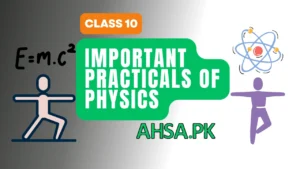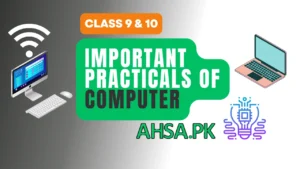Guess paper Physics for Class 9 is up-to-date and the most important questions are given according to Punjab boards. These guess papers will help you get the highest marks on your papers. Punjab Board guess paper Physics is relevant to all chapters and we have tried to include all necessary questions that help students score more than seventy percent.
9th class Physics guess paper by Ahsa.Pk is available and you may ask if you need any assistance from our qualified team. Physics Class 9 guess papers are for helping material that may enhance the chances of the students getting more marks in less time.
Guess Paper Physics Class 9
9th Class Physics Important Short Questions
Chapter 1
- Define physics
- Define base and derived quantities.
- Define the least count.
- What are vernier calipers?
- What is Vernier Constant?
- Define least count.
- Define Plasma Physics.
- Define Geophysics.
- Define unit. What is the role of the SI unit?
- Define significant figures.
Chapter 2
- How is a vector represented graphically?
- Differentiate between constant and variable speed.
- Differentiate between scalars and vectors.
- Define retardation.
- Define acceleration and write its unit.
- Define uniform velocity.
- What is g? Write its value.
- Write equations of motion for uniformly accelerated bodies.
- Draw a graph for a body moving with uniform velocity.
- Define the terms: linear motion, random motion, and vibratory motion.
Chapter 3
- Why Newton’s first law is also known as the law of inertia?
- Define Newton’s second law and write its formula.
- Give two advantages of friction and two disadvantages of friction.
- Give the difference between mass and weight.
- Define density and write its mathematical formula and unit.
- Define Newton’s third law with an equation.
- What is centrifugal force?
- Define momentum and write its formula.
- When a gun is fired, it recoils. Why?
- Define isolated system.
- Give the methods to reduce friction.
- Why rolling friction is less than sliding friction?
- What is the Atwood machine? Write a use.
Chapter 4
- Define head to tail rule.
- What is the resultant force?
- Define resolution of force.
- What is a rigid body?
- Define the axis of rotation.
- Define center of mass.
- Define the center of gravity.
- Define torque.
- Define the first condition for equilibrium.
- What is stable equilibrium?
- What is unstable equilibrium?
- What is neutral equilibrium?
Chapter 5
- What is G? Write its value.
- Derive the mass of the earth.
- Define gravitational field.
- Define artificial satellite.
- What is GPS?
- What is a field force?
- State law of gravitation.
- Explain, what is meant by gravitational field strength.
- Why does the value of g vary from place to place?
- On what factors the orbital speed of a satellite depends?
- Why communication satellites stationed in geostationary orbits?
Chapter 6
- Define work. What is its SI unit?
- Why do we need energy?
- Differentiate bewteen work and energy.
- Define P.E. Write its formula and unit.
- Why are fossil fuels called non-renewable energy resources?
- Which form of energy is more preferred, and why?
- Name a device that converts mechanical energy into electrical energy.
- What is meant by the term power?
- Define watt.
- What is the efficiency of a system?
- What is magma?
- What is Einstein’s mass-energy equation?
Chapter 7
- Define barometer.
- Give the differences between stress and strain.
- What is a tensile strain?
- Define pressure. Write its SI unit.
- Define elasticity.
- State Pascal’s law.
- Give applications of Pascal’s law, any three.
- What is Hooke’s law? Define elastic limit.
- Give the working of vacuum cleaner.
- What is Young’s modulus?
- State Archimedes principle.
- What is the principle of floatation?
- What is upthrust?
Chapter 8
- Define the terms heat and temperature.
- How evaporation differs from vapourization?
- What is meant by internal energy?
- What is thermal equilibrium?
- Define latent heat of fusion.
- Define latent heat of vapourization.
- Define bimetal strip.
- What is linear thermal expansion?
- What is volume thermal expansion?
- How does temperature determine the direction of the flow of heat?
- What is specific heat capacity?
- Give uses of thermal expansion.
- Define the coefficient of linear thermal expansion.
- Define the coefficient of volumetric thermal expansion.
Chapter 9
- Why metals are good conductors of electricity?
- Why conduction of heat does not take place in gases?
- What measures do you suggest to conserve energy in the house?
- Why transfer of heat in fluids takes place by convection?
- What is meant by convection current?
- Give uses of conductors and insulators.
- What is the greenhouse effect?
- What are a land breeze and sea breeze?
- Give uses of Leslie’s cube.
- What is gliding? How a glider remains in the air?
- What is radiation?
9th Class Physics Important Long Questions
Chapter 1
- Write four branches of Physics.
- What is a stopwatch? Explain its types.
- What are significant figures? Write its rules with examples.
Chapter 2
- Explain and derive vf = vi+at
- Explain and derive S = vit + 1/2at2
- Explain and derive 2aS = vf2 – vi2
Chapter 3
- Define and explain Newton’s first law and law of inertia.
- Define and explain Newton’s second law.
- Define and explain Newton’s third law.
- Define and explain the law of conservation of momentum.
- Explain and derive Fc = mv2/r.
Chapter 4
- Determine the resolution of a force into rectangular components.
- Define and explain the couple with examples.
- State conditions for equilibrium.
Chapter 5
- Explain the law of gravitation with a diagram.
- Describe the motion of the artificial satellite.
- Derive the mass of the earth with a diagram.
Chapter 6
- Explain two major renewable sources of energy.
- Describe how energy is obtained from the solar cell and house heating.
- Write a brief note on the interconversion of energy.
Chapter 7
- Explain different states of matter on the basis of Kinetic Molecular Theory.
- State Archimedes principle.
- State Pascal’s law. Explain the application of Pascal’s law.
- Explain the principle of floatation with suitable examples.
- Define Young’s modulus. Derive its mathematical formula.
Chapter 8
- What is thermal expansion? Explain on the basis of Kinetic Molecular Theory.
- Explain the linear thermal expansion of solids.
Chapter 9
- On what factors conduction of heat depends? And define thermal conductivity.
- Write down the uses of conductors and non-conductors.
- What do you know about the convection currents in the air? How do land and sea breezes blow?
- What is gliding? And what do you know about birds gliding?
- What is Leslie’s cube? How various surfaces can be compared by the Leslie cube?
- What is the greenhouse effect? Explain global warming.
9th Class Physics Important Numerical Problems
Chapter 1
1.2, 1.3,1.7, 1.8, 1.9, 1.10
Chapter 2
2.1, 2.6, 2.10
Chapter 3
3.1, 3.2, 3.4, 3.5, 3.8, 3.10
Chapter 4
4.2, 4.3, 4.4, 4.5, 4.6, 4.9
Chapter 5
5.2, 5.4, 5.5, 5.8, 5.9
Chapter 6
6.1, 6.2, 6.3, 6.7, 6.8, 6.9
Chapter 7
7.1, 7.2, 7.3, 7.4, 7.6 7.9, 7.11
Chapter 8
8.1, 8.2, 8.5, 8.7, 8.9
Guess Paper Physics Class 9 is for all students.
Guess Papers for Class 9
Schemes of Class 9
Click here for the 9th Class MCQs Test











